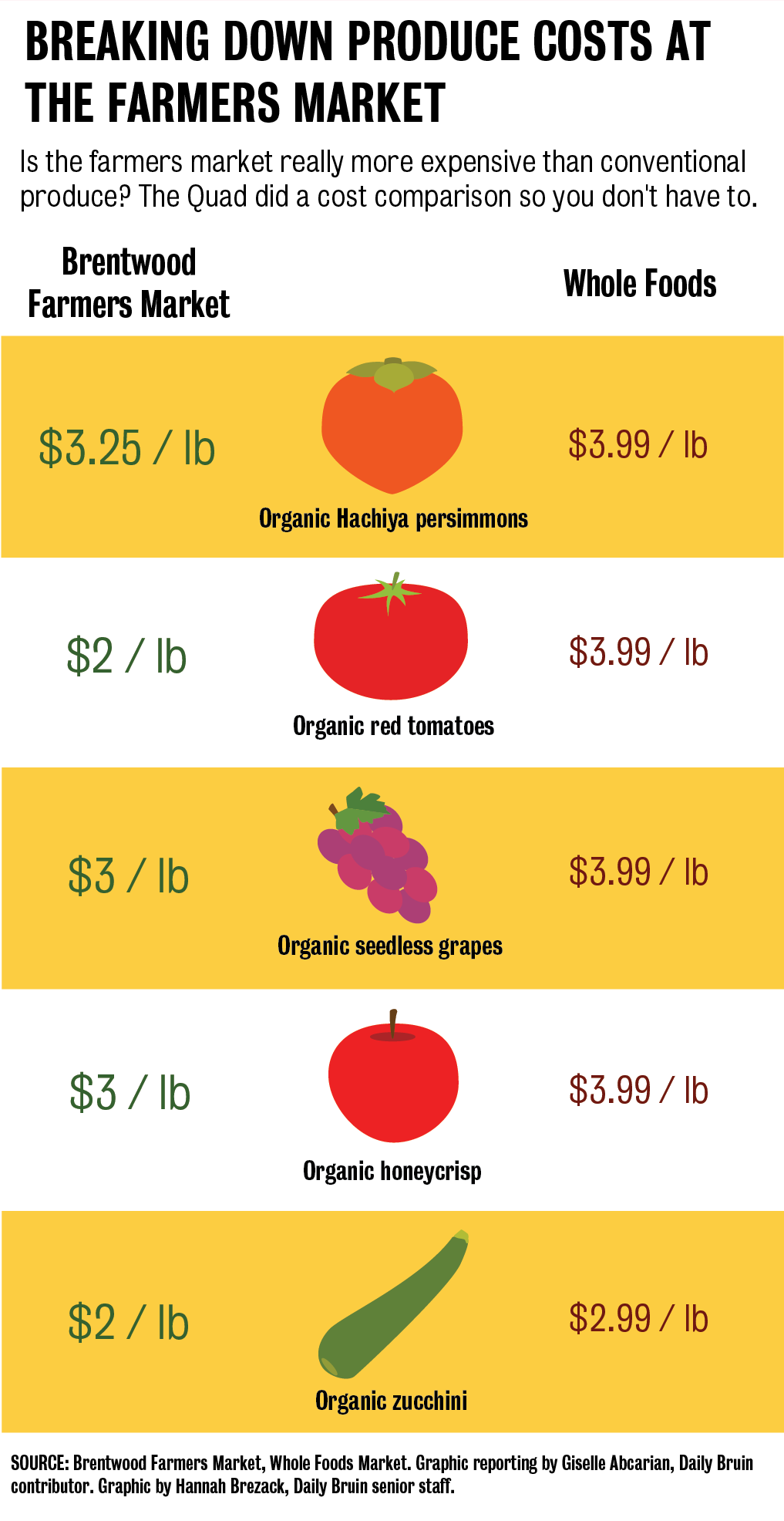The Quad: Brentwood Farmers Market helps reduce hunger, spending, carbon footprint

By Giselle Abcarian
Nov. 12, 2016 5:26 p.m.
On a typical Sunday afternoon, you’re most likely doing one of three things: brunching with friends, grocery shopping for the upcoming week or lying in your bed, attempting to beat your hangover while trying to decide which of the first two to tackle.
In all three cases, a trip to the Brentwood Farmers Market might be your best bet. Instead of spending an hour in line for brunch, the whole day in the library or all your life savings at the Whole Foods Market, a 10-minute drive to the farmers market could save you time, money and even help you with your studying.
If your goal is to eat brunch, the Brentwood farmers market has you covered. Unlike the Thursday afternoon Westwood Village Farmers Market, which provides a small variety of hot food, the Brentwood farmers market offers dishes such as crepes, fresh baked pastries, smoothies, breakfast burritos, tamales and fried chicken in a waffle. You’re bound to find something to satisfy your brunch cravings. With the generously portioned samples offered by most of the vendors, however, you might be full before you can even decide what to order.
You’ll surely be enticed to the Bolani East & West Gourmet Afghan Food stand, where the vendor will present you with a free sample of a spinach-stuffed flatbread topped with hummus, pesto and sweet jalapeno jelly.
“If you get hungry again, come back around for more!”
At this point, you’re probably stuffed from the 10 different types of apples and persimmons you’ve just sampled at the fruit stands, but I’m sure you’ll accept these tasty offerings. The only thing better than brunch is free brunch.
While you can find the generous Bolani at Westwood farmers market as well at $6 a spread, you may find this price a little steep. At the Brentwood Farmers Market, you can find at least five other vendors selling a variety of hummuses and spreads at more college-friendly prices. Last Sunday, for example, I walked away with a roasted red pepper hummus, a garlic basil spread and a three-layer dip all for $5 from the Brothers Products stand.
If you like to shop for organic fruits and vegetables, the farmers market is a lot friendlier on the wallet than Whole Foods Market. A price comparison of organic produce from the Brentwood Farmers Market and Whole Foods Market shows that vendors offer lower prices.
Another benefit of doing your grocery shopping at the farmers market is that you can ask the vendors how they grow their food, which is especially helpful if you’re worried about chemicals-sprayed products.
When you buy organic food at the grocery store, even if it’s labeled with the USDA-approved organic sticker, it can still be legally exposed to or mixed with about 200 different inorganic substances. For example, ethylene, the chemical used for post-harvest ripening of fruits, can be legally used, as well as coloring agents, such as inorganic beet juice extract. Unless it is specified that the food item is 100 percent organic, you can’t be exactly sure how the product is grown or treated.
Having a direct connection with the farmers allows you to better understand where your food comes from and how it’s being treated. It also gives you the chance to ask vendors how they would cook a certain product, which can be valuable information, especially if you live in an apartment and want to prove to your roommates that you can cook more than instant ramen.
Even if you don’t typically buy organic food, the farmers market offers you the chance to eat locally and seasonally, which is not only better for the local economy and the environment, but can also expose you to a variety of new foods.
When you buy food from the farmer’s market, you are supporting local farms, which reinforces job opportunities for the surrounding community. It also ensures that your money contributes to the local economy, which keeps money circulating in small businesses and helps prevent large corporations from buying them out.
Because local food is grown in the area, when you purchase food at the farmers market you help decrease the greenhouse gas emissions created from long-distance food transport. And with less transport involved, less waste is generated because the food is sold to the public before it has time to get spoiled.
A byproduct of this diversification of agriculture is that you may discover new fruits or vegetables that aren’t sold in standard grocery stores. Without my trip to the Brentwood Farmers Market, I may never have discovered my love for baby pattypan squash, a variety of summer squash known for its small size and scalloped edges.
Because vendors at farmers markets sell seasonal products, their produce selection is constantly changing. This also means that the produce will most likely be tastier, because each product is grown during its optimal season.
While it may seem more convenient to walk into Westwood for your Sunday brunch or errand run, the Brentwood Farmers MMarket could be worth checking out for your taste buds, wallet and carbon footprint.


